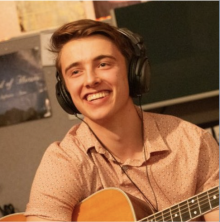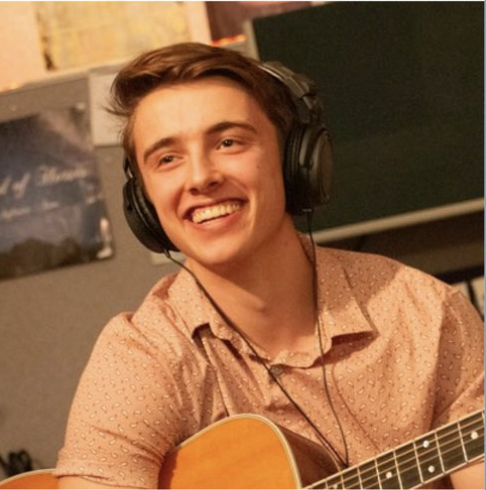
August Rosedale always liked taking things apart to see how they worked. While a student at Bay, he spent many hours in the Project Center and took all the engineering classes he could with Brad Niven. Now, as a mechanical engineering major in his senior year at Santa Clara University, August is back in the shop, spending a lot of time in the campus’s new STEM building, “finally” getting to do what he’s most interested in after the initial years of math and physics coursework.
The extra time brought by the pandemic, however, took him into a different world. His curiosity with how things work has often led him to investigate how they could work, to see what else they could do, and over the past year, he’s been roaming the landscape of artificial intelligence, digital art, and NFTs. It's brought him some unexpected fame and lots of fans, but he keeps it down-to-earth.
Deep, Without the Fake
In ways that many did not anticipate—though one might argue they should have—AI has come to be an instrument of troubling uses. In fall 2020, August became interested in how deep fakes were made. The tech is impressive, but the more he played around with it, the less benefit he saw. He says, “I thought it was cool, but there are so many ways to manipulate people and do bad things. I almost had a hard time coming up with beneficial uses.” Exploring the machine learning (ML) world, however, led August to people who were using it to create artwork, and that’s where he found the spark for a big endeavor, Mirage Gallery, which is at the forward edge of AI, NFTs, and new means of creative expression.
August was having fun looking for novel but positive uses of AI, and he gradually hit on the idea of combining the most interesting aspects he was encountering along the way. First he started training models* that could generate original artwork in different styles. Then his friend at college—and now business partner—Lucas, gave him access to GPT-3, a text-based natural-language processing system that creates realistic conversations via text, so he played around with that. Then he saw someone who was training models on pictures of human faces, so he started making faces.
By now, he was wondering, “How can I put all this together? Well, I can make art, I can make faces, and I can make text... and that can make an artist.” Meet Taylor and Alejandro, August’s first AI-generated artists, represented by his online gallery, Mirage. Each artist has now produced a sizable body of work, with pieces selling out on their first offering. (You can see works for sale and purchase with ether on OpenSea.)
And August’s mind continued to roam. He had started out selling one-of-one physical prints by Alejandro and Taylor, and then moved into NFTs, but he wanted to know what other possibilities lay beyond the creation of one-off static artworks. This is how Mirage’s Crypto-Native experiment came into being. Crypto-Native is also an AI-based artist, but each artwork is designed to change. Each evolution is prompted by the secondary sale of a work on OpenSea. In other words, each time an owner sells the NFT on, it changes, so the next buyer is getting another original artwork. The first drop of Crypto-Native works, in September 2021, was so successful that the pieces were getting minted too fast and triggered an error in how they displayed. August and Lucas stayed up fixing the bug for 27 hours straight, and since then Mirage Gallery has done regular brisk business.
“When I was first starting,” August says, “I [thought] I was creating artists, but as I've been in this space more, people started referring to me as an artist, and I didn't really think of myself like that. It’s an interesting debate…maybe my way of [making art] is by spending time doing this code and putting this data set together, running it, and seeing these beautiful pieces.”
Looking Toward a Human-Centered Future
This experience has prompted a lot of big-question conversations for August about the ethical applications of AI and its need for human guidance, quite literally, in order to yield beneficial results.
He explains, “GPT-3 is still in private beta because it's so powerful. And if you skew it, if you try to steer it in an offensive direction, it'll pick up on that quickly and do that fully. It's just trying to predict the best text to fit your prompt. It has been trained on 500 gigabytes of text, on stuff on the Internet, so it's seen all sorts of biases. Ask it to pretend to be somebody who believes [one thing], it'll do that. Ask it to pretend to be someone who believes the opposite, it'll do that. It's nothing to do with what it actually thinks. The important thing is to create unbiased datasets. The AI doesn't know any better. Training it on all sides of the story, that’s important—the same way you educate people. With AI, it's going to be really important to know what you can do with a model, how big the data set has to be, and what applications that AI has and who has access to it.”
He also has simple advice for anyone looking to buy NFT art: Buy artwork that you actually like looking at. He's happy, of course, to be making money on the Mirage Gallery endeavor, but he's equally happy to be creating something that people like and that adds beauty to the world. In a recent podcast, the host even admired August's "moral compass" in his use of the technology.
In His Spare Time…
Ironically, August doesn’t necessarily intend to remain in AI or even in software development. He still loves his studies in mechanical engineering and being in the shop devising solutions to real-world problems, but for now Mirage Gallery is going strong and he maintains another side business, called OmnyLaunch, that does app development and coding for start-ups.
When he’s not doing any of those things, August continues to play guitar, which he also taught regularly for about 10 years. His favorite books include the modern classic The Singularity Is Near by Ray Kurzweil and The Future Is Faster Than You Think, by Peter Diamandis. He approaches other media with mindfulness: “I try really hard to avoid things that are just trying to take advantage of my brain.” Words to live by!
Listen to an interview with August on the Kevin Ly podcast.
* In ML and AI, “training models” refers to refining how an algorithm behaves based on the data input and your desired outcome. You can purchase or use open-source architectures for training. August creates his own data sets so that his outputs are always original.













.jpeg&command_2=resize&height_2=85)





